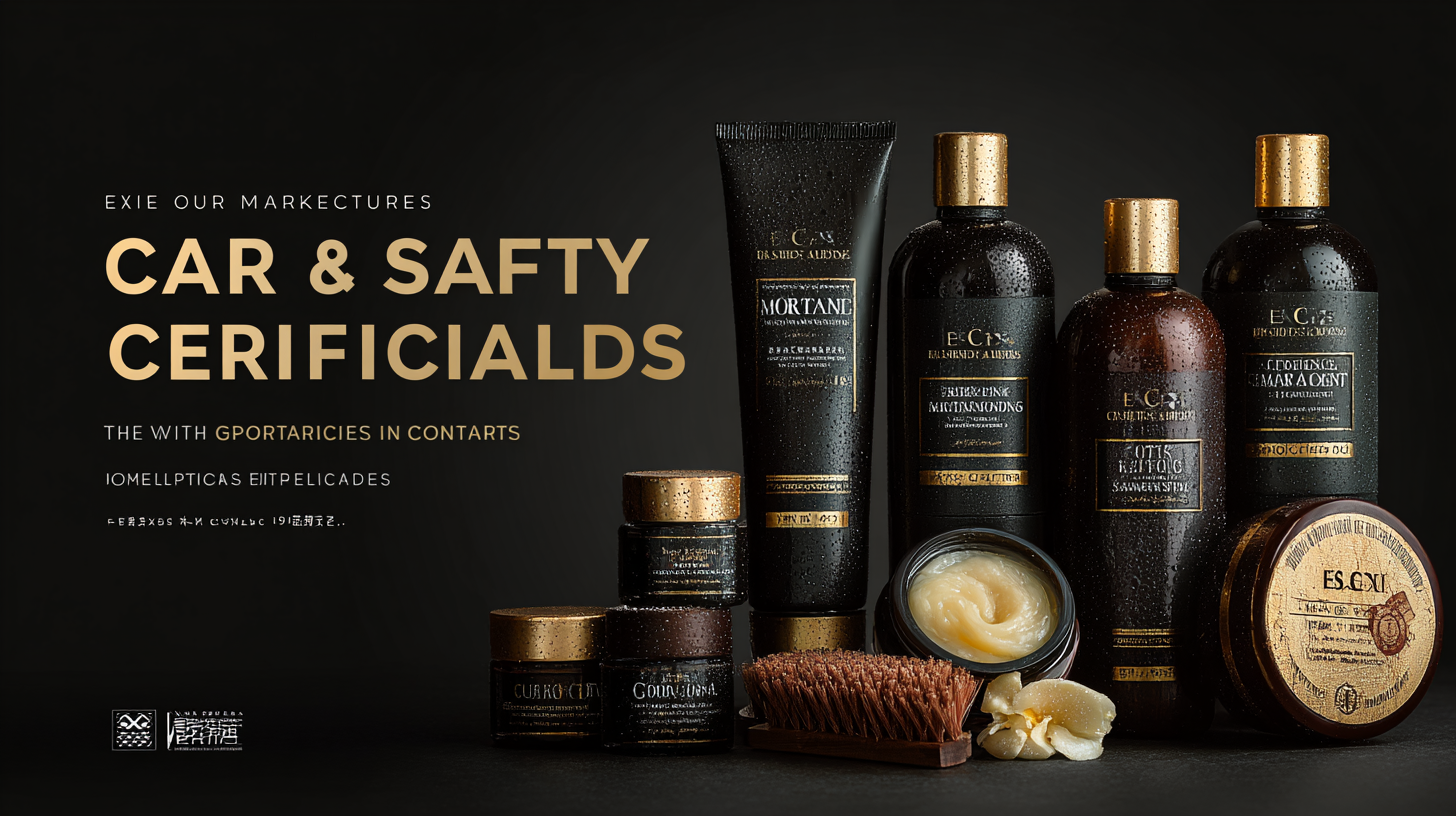“Unlocking Global Markets: The Role of Export Certification in Best Care and Beauty Products”
In the rapidly evolving landscape of global trade, the significance of export certification for care and beauty products cannot be overstated. With consumers becoming increasingly discerning about the quality and safety of the products they use, manufacturers must navigate an intricate web of regulations and standards to ensure their offerings meet international expectations.

This blog will delve into the critical technical specifications required for various care and beauty products, providing a comprehensive guide on how to obtain necessary certifications. By understanding the nuances of export certification, companies can not only unlock access to global markets but also enhance their brand reputation and consumer trust.
Join us as we explore the vital role of certification in ensuring that care and beauty products deliver on their promises, enabling businesses to thrive in a competitive international marketplace.
Understanding Export Certification and Its Importance in the Beauty Industry
Export certification plays a crucial role in the beauty industry, ensuring that products meet international quality and safety standards. According to a report by MarketsandMarkets, the global beauty and personal care market is expected to reach $716.6 billion by 2025, with a significant portion of this growth attributed to exports. As brands seek to penetrate lucrative global markets, obtaining the necessary export certifications becomes essential not only for compliance but also for building consumer trust.
In recent years, the demand for certified organic and cruelty-free products has surged, with a 2021 survey from Statista indicating that 42% of consumers prioritize eco-friendly certifications. Export certification helps companies demonstrate their commitment to these values, addressing the increasing preferences of conscientious consumers. Moreover, the absence of proper certification can lead to substantial losses; a study by the International Trade Centre revealed that companies without certifications could miss out on an estimated 30% of potential export sales. Thus, navigating the complexities of export certification is vital for businesses aiming to thrive in the competitive beauty market.

Key Qualities to Look for in a Reliable Supplier for Care Products
When sourcing care and beauty products for global markets, the importance of selecting a reliable supplier cannot be overstated. As per a report from MarketsandMarkets, the global beauty and personal care market is projected to reach $805.61 billion by 2023, necessitating that companies choose suppliers who can meet stringent quality standards. Reliable suppliers should possess certifications such as ISO and GMP, ensuring that their products are manufactured under quality-controlled conditions. These certifications not only enhance consumer confidence but also enable easier market entry into highly regulated regions.
Moreover, transparency in sourcing ingredients is crucial. According to a survey by the Environmental Working Group, nearly 70% of consumers prefer products with clear ingredient lists, signaling a growing demand for transparency in beauty products. Reliable suppliers often provide detailed documentation about their sourcing practices and ingredient safety, helping brands build trust with their customers. Additionally, suppliers should demonstrate adaptability to regulatory changes across different markets, ensuring that their products remain compliant with the latest safety standards and trade regulations. By focusing on these key qualities, companies can effectively navigate the complexities of the global beauty market.
Navigating Global Markets: Strategies for Selecting Export-Ready Products
Navigating the complexities of global markets requires businesses, especially in the care and beauty sector, to align their export strategies with international standards. To successfully select export-ready products, companies must consider not only product quality but also compliance with varying certification requirements across regions. For instance, markets like China and Japan have stringent regulations for cosmetic imports, necessitating thorough understanding and effective navigation of these barriers.
Tips: To enhance your selection process, conduct market research to identify the most promising regions for your products. Utilize resources such as the International Trade Centre’s Market Analysis Tools, which provide valuable data on market trends and consumer demands.
Furthermore, developing resilient supply chains is crucial amid rising geopolitical risks. Companies must diversify their sourcing and shipping strategies to mitigate potential disruptions. An analysis of emerging trade trends indicates that businesses focusing on adaptability and sustainability are better positioned to thrive in uncertain environments.
Tips: Engage in strategic partnerships with local firms in target markets to foster connections and facilitate smoother entry. Additionally, consider export ventures into emerging sectors, such as organic and eco-friendly products, which continue to gain consumer traction globally.

Assessing Certification Standards: What Makes a Beauty Product Compliant?
In the competitive landscape of the beauty industry, export certification plays a pivotal role in ensuring products not only meet market demands but also adhere to safety and quality standards. Compliance with certification standards is crucial for beauty products aiming to enter global markets. Various organizations, such as ISO and GMP, set forth comprehensive criteria that manufacturers must fulfill to achieve certification. These standards often address product safety, ingredient transparency, and ethical sourcing practices, all of which increase consumer trust and enhance brand reputation.
Evaluating these certification standards involves a meticulous assessment of multiple factors. Firstly, the ingredients used in beauty products must be evaluated for safety and compliance with local regulations in target markets. This includes ensuring that formulations do not contain banned substances or allergens. Secondly, the manufacturing process itself must undergo scrutiny to confirm adherence to Good Manufacturing Practices (GMP), which ensures consistency and quality throughout production. Lastly, environmental considerations, like sustainable sourcing and packaging, are increasingly becoming part of compliance requirements, reflecting a growing consumer demand for eco-friendly products. By focusing on these key areas, beauty brands can not only secure necessary certifications but also position themselves favorably in a crowded global marketplace.
Unlocking Global Markets: Export Certification Compliance in Beauty Products
Building Lasting Relationships with Suppliers for Sustainable Success in Exports
Building strong relationships with suppliers is pivotal for companies seeking to thrive in the competitive landscape of global beauty and care product exports. A recent report by Research and Markets indicates that the global beauty market is expected to reach $750 billion by 2024, driven largely by the increasing demand for organic and sustainable products. Establishing trust and collaboration with suppliers can enhance the quality of products and ensure compliance with international export certification standards, which are crucial for accessing markets like the European Union and North America.
Tip: Engage suppliers early in the product development process to foster innovation and align on quality standards. This collaborative approach can lead to the creation of unique products that stand out in crowded marketplaces.
Effective supplier management also involves continuous assessment and feedback. The Deloitte Global Powers of Retailing report highlights that companies that invest in supplier relationships see improved operational efficiency and reduced costs, which directly impacts profitability. By prioritizing communication and feedback mechanisms, businesses can adapt to market changes and ensure that their products meet evolving consumer expectations.
Tip: Regularly conduct supplier audits and performance evaluations to ensure alignment with your company's quality and sustainability goals. This not only builds trust but also supports long-term partnerships that are beneficial for export success.
